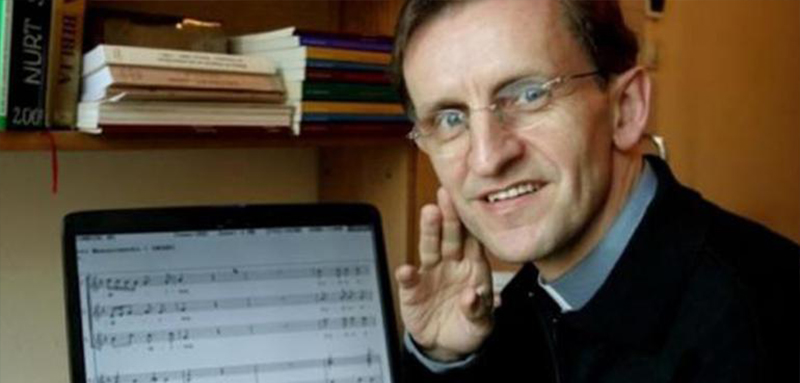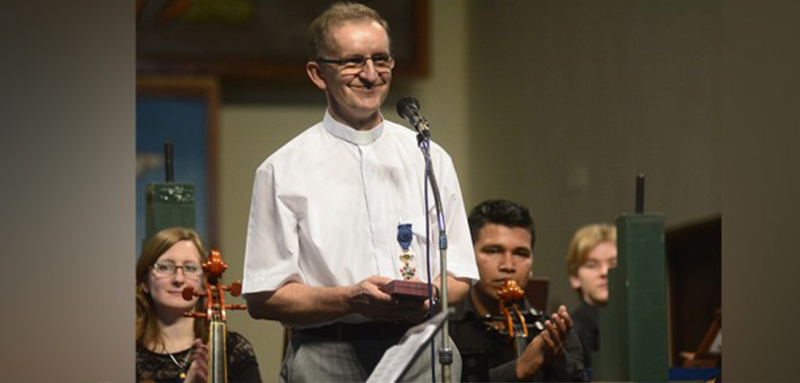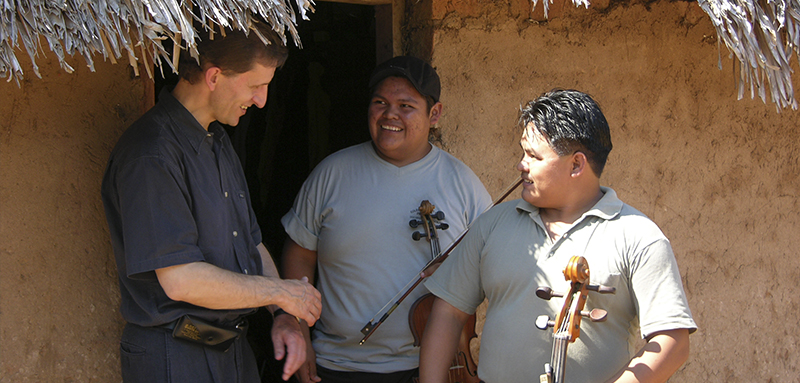Nowrot Piotr, a musician and an organist, entered the Society of the Divine Word in 1974 after completing his studies in theology and sociology at the Catholic University of Lublin in Poland. His passion for music started when he was a child. He sang as a contralto and as a tenor in a children’s choir in Poznan when he was eight until he was nineteen.
He observed that music is closely related to religion, for the fact that Jesus, the apostles and even the Virgin Mary along with the church have been singing throughout the generations. At the moment, he claims that this discipline is “one of the methods for the new evangelisation.” The life of Nowrot Piotr is pure art in a family that has great affection for culture and the arts.
Where did your passion for music come from and why did you choose Bolivia to begin your studies in music?
I was born in a family of nine children. My parents were simple people but very zealous. They loved music. They went to the theatre and they read a lot. My father was a bricklayer/constructor, but didn’t like to listen to any music other than classical music. My mother who has nine children was a dressmaker and worked only at home. The war made it difficult for her to complete her studies other than primary level or to learn a skill.
I’m the sixth child and the eldest among my brothers. We all learned music. My older sister began to have music classes when she was six years old. Therefore, when I was born, music was played there every day because somebody was practicing something. In addition, in our house, the district choir had practices twice a week.

I started learning music from my sister when I was six. When I was eight years old, I went to a school of music to learn to play the piano. At the same time, I joined the Boys’ Choir of Poznan, one of the most famous in Europe and they are known all around the world. I was a member of the said choir until I entered the seminary.
At the age of eleven, I started playing the clarinet. Jazz music is and remains my ultimate passion and I did that very well. When I entered the seminary, my interest changed to Gregorian chant since nobody was playing it. However, I never imagined that I would become a musician and expert in classical music, since I also like other kinds of music. There are some types of music that I don’t like though, like modern music, and I find it difficult to call it music; maybe I could call it cult music.
You have a Bolivian youth choir in your mission. How does music help in the development of adolescents in the region?
In the SVD, like in our seminary and communities, music occupies a minor place. The young people who complete their formation do not appreciate the value of music other than commercial music. Music like the Gregorian chant, sacred polyphony and the like seems something unfamiliar in their lives.
Everything changes when one speaks of the parishes, particularly in my mission in Bolivia in the last two decades. The Chiquitos, Moxos, Guarnies, Guarayos and others, these people established more than twenty music schools where young people learn to play music and sing as well. In twenty years, thousands of young people have received education in music and there are towns where one of every four person knows how to read music. They also have ornate polyphonic Masses and have learned to sing and play in a week or even less. They love the repertoire of classical music. This type of music was used as an instrument of evangelisation for our ancestors. It was also played in concerts and baroque sonatas, they organised presentation of operas, oratories, lamentations, passions, etc., and they sing classical/old music with texts in their own languages. Every April we celebrate a music festival in Bolivia. There were around 1,040 musicians: 240 of them are from overseas (23 countries) and the rest are from Bolivia. Among those from Bolivia, eight hundred learned music.
In our missions, music plays an important part in many aspects. It is played in the church, in the parish house, in the school of music, in the plaza, in the houses and even in the soccer field. Since music attracts many people it is organised in mission areas and because of this our churches are lively, hundreds of young people come for practice and they are spending more time together. We consider this as one of the methods of new evangelisation. In America, there’s no evangelisation without music since its beginning from the end of the fifteenth century until the present.
Music helps in praying, in integration, in formation and it helps in making people to become more creative, more systematic and more suitable for group work. This is the kind of music that we do.

How do you manage to complement your two vocations of being a religious and being an artist?
It’s easy, since the Last Supper, art in all its manifestations has accompanied us in the liturgy. Although it has gone through several stages of development and transformation, we know that Jesus and his apostles, the Virgin Mary and the Church in all generations have been singing. The religious music is always good, since its main task is to praise God and raise our minds to heaven. The music gives meaning to the words in every group that reciting alone cannot express. Being a religious and a missionary, I soon discovered that God has given me this vocation and at the same time, to apply my talent in music in my apostolate to which I was sent. If God gives someone a talent, it is there to be used and to multiply it, as the gospels say.
With music, it has been easier for me to reach people and make friends. Music helps me to be a better person and pray more deeply. For example, the Veni Creator that is sung is never the same if it is being recited. It is a hymn and should never be recited. Again, I believe that my vocation is singing.
In what manner have your studies in music served you to give a different purpose in music and in this case bring it more closely to the people?
My study in music is missionary music, music that is suitable to enrich our worship and to evangelise. And this kind of music can also be used in other contexts: concert halls, classrooms, social gatherings, etc. Its aesthetic and spiritual value is so good that this music is no longer only used in Bolivia but has acquired a universal character. It evangelised and transformed us for all time, in the peoples Bolivia, America, Europe and the rest of the world, both among the young and the old. This music should not remain in the archives. It should create wonderful sound. That is why we need to rebuild it, with serious studies and academics and put it to the range of the musicians and in all contexts of human life.
We have been doing it for 25 years. The lives of many have changed and improved. For two decades, this music was only known in the small villages of Bolivia. Today, it is presented in big liturgies in cathedrals, mission churches and papal masses. Last year, when Pope Francis visited Bolivia, we performed it with 1,134 musicians, which was regarded as the largest sung mass in the entire history of the Catholic Church. This music was presented in large concert halls around the world. To mention some, it has been done in the Wigmore Hall in London, the Kennedy Centre in Washington, D.C., the Concertgebouw in Amsterdam, in Tokyo, in Seoul, etc. It was sung by important singers of our times: Emma Kirkby, Florilegium, Elyma, Chanticleer and hundreds of other musicians.
The musicians of Bolivia have travelled the world with this music. Our musicians were sponsored in The Hague, Basel, Amsterdam, the United States, etc. Today, they perform in large festival, liturgies, and presentations of the talent that was hidden in the jungle. Now, people live better, especially the musicians of Bolivia, because this kind of music is being performed again.

What tools are you using to make your music group enhance the local culture?
In Bolivia I am working with more than thirty groups. In addition, I travel around the world to work with international musicians and give classes in music academies. However, the main tool to spread this music is during the festival of classical music that happens every two years. We organise it along with my colleagues in Bolivia. This year we have organised the eleventh festival. The dates will be from 22nd of April until the first of May. We have submitted 147 concerts, sung in twenty-four masses with local and international musicians in ten days. In this festival, musicians from 34 countries were invited but only 23 accepted. For the festival, we are publishing five new studies (one from my ex-student and four from my works) and to preserve the festival we are editing four new cds. We will be publishing them later and they will be made available throughout the world.
The biggest tools for this though are the schools of music that exist in the missions. Now, there are more than twenty. Over two years ago, almost two thousand people were in training to have a place in the festival. This has an effect on their lives and on the musical culture of the entire country.
What is the significance in your life to receive national and international recognition, like to be a recipient of the official Cross of the Order of Merit from your country and other countries like Spain?
The award I want to win in my life is that when I will be face to face with the Lord, hopefully he tells me, “my prudent and faithful servant, enter into my kingdom.” But this does not contradict each recognition and this has other dimensions that the life beyond would consider it with little importance. No, on the contrary, every award gives me more encouragement and dedication in my work, my vocation, my studies and my service. I have received awards from Queens, presidents, academics, institutes (Reina Sofia, Order of Merit, Guggenheim, BenedictusPolonus…) and others.
Each one I accepted with great emotion as if it was the biggest event in my life. I do not hang it up on the wall. I keep it in my heart and in my mind, so that it will be with me wherever I am and to remind me that I have commitments with these recognitions and I have to give my best. I dedicate myself to the causes for which I was recognised. Above all, I serve the people I meet in my life, at the same time, they know they are part of these awards. This commitment will not be temporary but will last for as long as I live.

In your entire career both as a musician and a religious, what is the best moment that you consider the most rewarding?
I try to live in such a way that every encounter is something for me of great importance and joy. Every person has given me something. Each experience has served me something. Even silence is music and contemplation is my philosophy. My family, being part of the Society of the Divine Word, and seeing musical manuscripts for the first time have an important influence on what I am. They are the moments for which I thank God.









